|
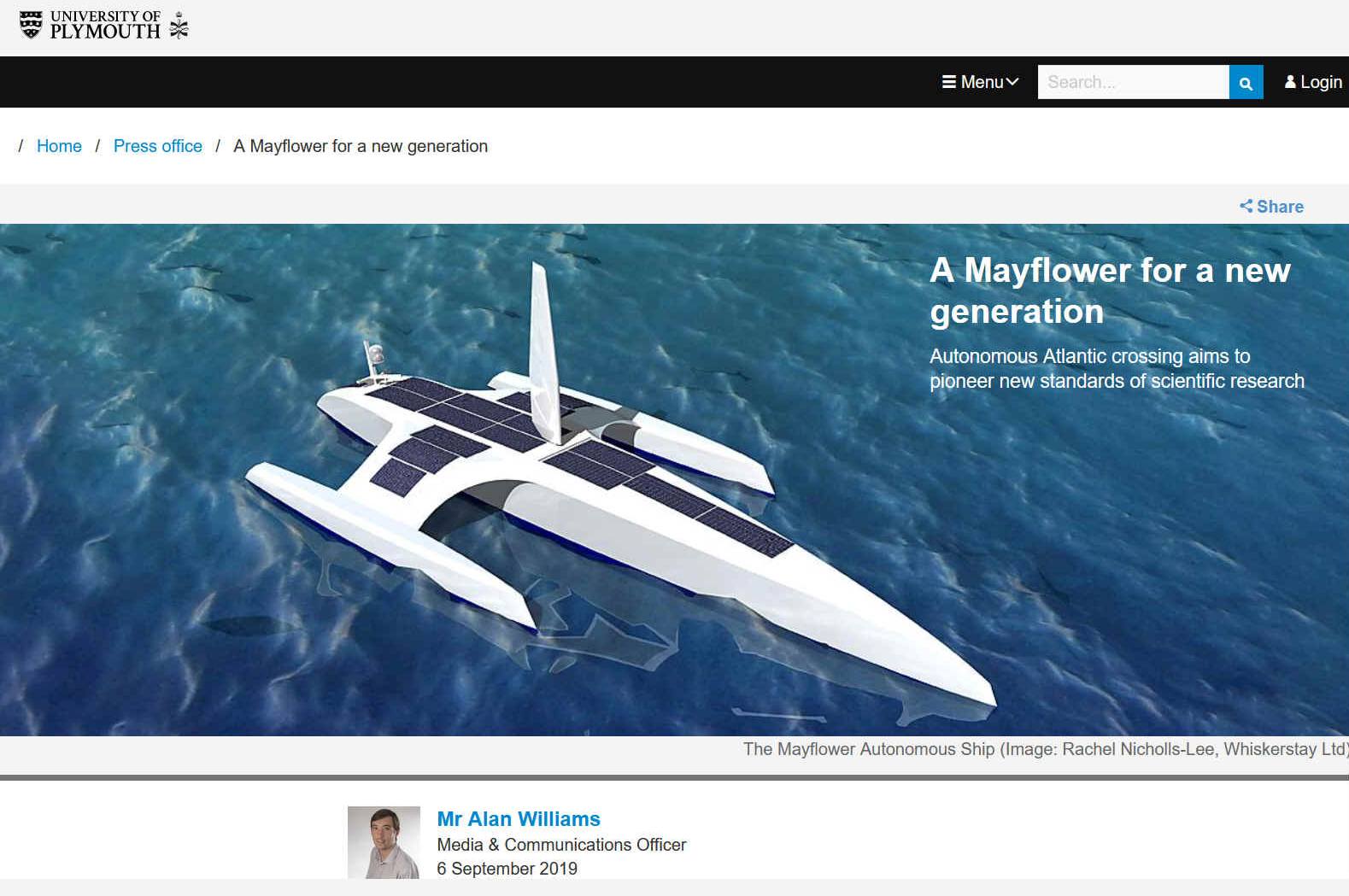
PLYMOUTH
UNIVERSITY - Is a Mayflower MAS400 partner. Mayflower 400 2020 commemorates the 400th anniversary of the Mayflower's pioneering voyage to America in 1620. The University is working in partnership to commemorate this historic voyage.
The University of Plymouth is ranked as one of the UK's top 10 modern universities in the UK (Times Higher Education Young University Rankings 2019) whose origins go back over 150 years to the School of
Navigation which was formed in 1862. The University covers a broad range of disciplines through its research and teaching and is a global leader in marine and maritime research, including marine litter research and was the first university to identify the widespread occurrence of
microplastics – a term first used by the University in 2004 and which is now in common use.
According to Professor Richard Thompson, OBE, Director of the Marine Institute, University of Plymouth "microplastics present a substantial challenge to our oceans. Over 700 species come into contact with marine litter which is found from the poles to the equator, and estimates are that the quantity of
plastic in the oceans will triple in the decade to 2025. The Mayflower Autonomous Ship gives us the opportunity to rethink how to collect data and further our understanding of this global issue."
SEPTEMBER 6 2019
According to their website, exactly one year from
today, an unmanned ship will set sail from Plymouth and attempt to complete a pioneering crossing of the
Atlantic
Ocean.
The Mayflower Autonomous Ship (MAS) will begin its journey on 6 September 2020, commemorating the 400th anniversary of the Pilgrim Fathers’ voyage to the new world.
Like its namesake in 1620, MAS will rely to some extent on favourable weather to complete its crossing as it will be powered by state-of-the-art
renewable energy technology.
It will also carry a research pod, featuring sensors and other equipment which scientists hope will pave the way for ground-breaking research into ocean conditions, marine pollution and conservation, and
autonomous
navigation.
The project was first conceived in 2014, since when the partners – all with roots in Plymouth, Britain’s Ocean City – have been refining designs to ensure it can survive whatever conditions the
Atlantic Ocean has to offer.
Those refinements also include ensuring it can be used beyond this voyage and become a prototype for autonomous marine research and exploration in the future.
MAS is being coordinated through a partnership headed by ProMare, a non-profit corporation and public charity established to promote marine research and exploration throughout the world. The research pod will be coordinated by the University of Plymouth, a world-leading centre of excellence for marine and maritime
education, research and innovation. Meanwhile MSubs, which has over 20 years' experience in mechanical engineering, composites, electrical, electronic and software design, will construct the vessel.
Fredrik Soreide, the ProMare Project Director, is quoted as saying:
“The original Mayflower voyage was all about exploration into a new world, and this project is to a large extent the same. It takes autonomous marine vessels to a new level and opens up countless scientific possibilities. We have made considerable progress over the past three years, and it is exciting to now see our vision taking shape as we continue preparations for the crossing next September.”
Professor Kevin Jones, Executive Dean of Science and Engineering at the University of
Plymouth, is quoted as saying:
“This voyage has the potential to be a real game-changer and cements Plymouth’s reputation as a world-leading hub of marine science. It gives us the genuine capability to explore new and innovative research opportunities that have not previously been possible. It also raises the bar in terms of autonomous vessels, a world first that could set the standard for others in the field to follow.”
The final agreed design is for a trimaran-style vessel that includes three research pods packed with state-of-the-art monitoring equipment.
That will include acoustic, nutrient and temperature sensors, along with
water and air samplers, that can create a picture of ocean conditions and mammal behaviour right across the Atlantic.
Work is well underway to build the vessel. The hull started construction at a shipyard in Poland earlier this week. It will return to
Plymouth in Spring 2020, where the final outfitting and testing will be completed under the direction of ProMare and MSubs.
Brett Phaneuf, Managing Director of MSubs, is quoted as saying:
“This ship, the third Mayflower, will appropriately commemorate its predecessor’s voyage 400 years ago. It will also allow us to usher in a new phase of research with state-of-the-art technology. It enables us to once again put Plymouth on the map and celebrate the huge diversity of talent we have here, people who are interested in new beginnings and like to lean forward into new opportunities.”
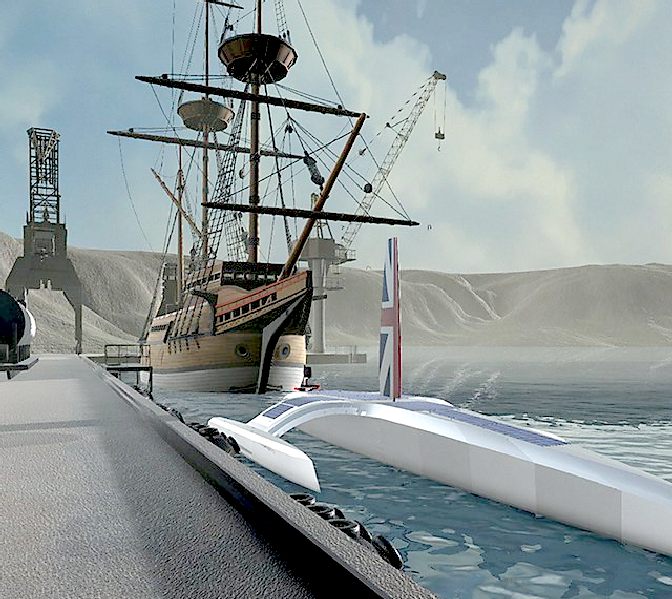
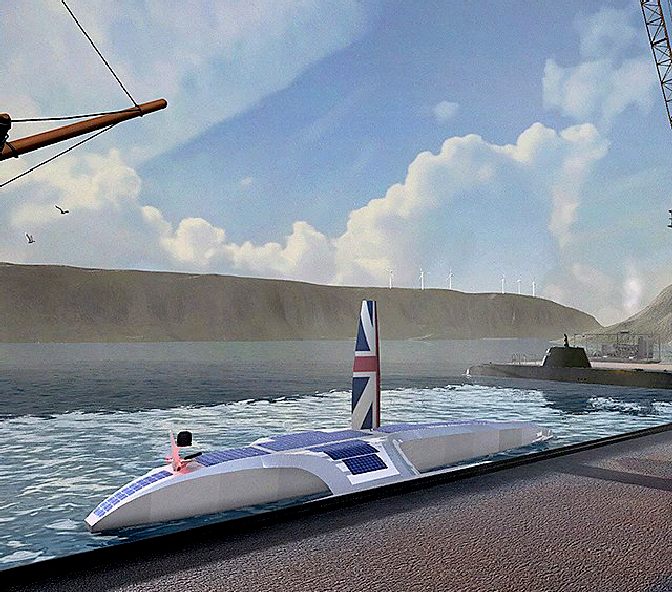
PLYMOUTH
- Has ties to the Royal Navy who operate nuclear powered submarines with
Trident, nuclear ICBMs as part of their payload, in denial of the recent
United
Nations ban on such weapons.
£3.5
MILLION FROM DEPARTMENT for DIGITAL CULTURE MEDIA & SPORT
Plymouth has been the starting point for many globally significant voyages of discovery. But few of these are better known or have provided such a lasting international legacy, as the sailing of the Mayflower almost 400 years ago.
Dr Kathryn Gray, the University’s Associate Professor in Early American Literature, explains:
“When the Mayflower left Plymouth harbour in 1620, it was not the first ship to set sail across the Atlantic to North America, and nor was Plymouth Colony the first successful English colony in the New World. And yet, through the signing of the Mayflower Compact, a document that agreed a form of representational government, and the celebration of the first Thanksgiving, the Mayflower voyage and the Pilgrims of Plymouth Colony became central to the popular origin narrative of the United States.
The experiences of the Mayflower passengers when they arrived in New England were, at times, harrowing: only half of the settlers survived the first winter, and without the help and resources from local Native American tribes, the Wampanoag in particular, it is unlikely that they would have survived at all. Embedded in this pivotal moment in history are the interconnected stories and experiences of the so-called Pilgrims, the indigenous populations, as well as other migrants to the North America, including slaves.
“As we near the 400th anniversary of the sailing of the Mayflower, the many legacies of this well-documented and well-known voyage, some of which are difficult and challenging, will be remembered, examined and debated.”
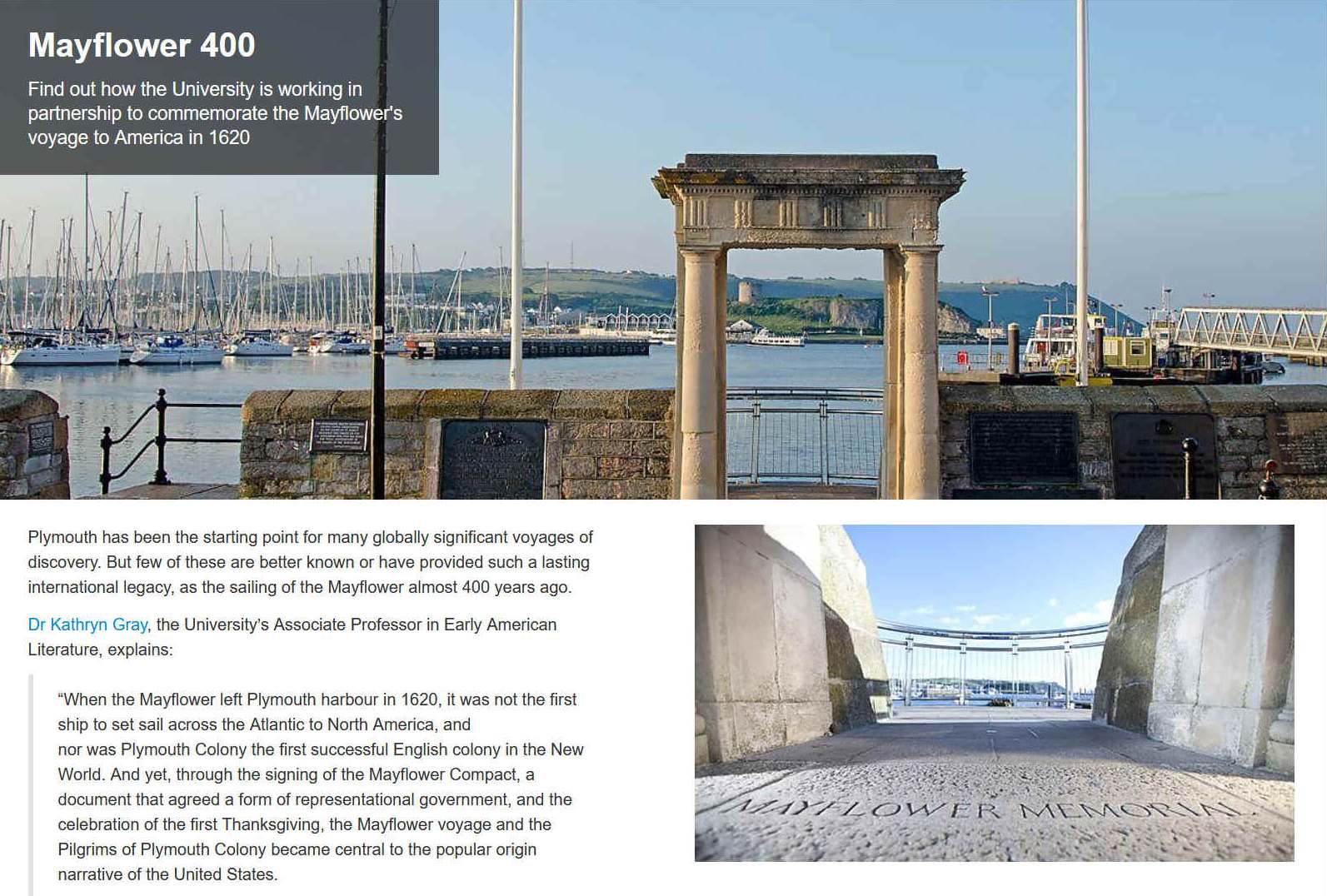
MICROPLASTICS
- Three research pods in the hull of the ship are being designed by scientists at the UK's University of Plymouth.
Director of the University's Marine Institute, Richard Thomson OBE, says the voyage is the first opportunity to sample the oceans for plastics, from an unmanned vessel.
Professor Thomson coined the term microplastics in a paper published 15 years ago, to describe the accumulation of fragments of plastic in the world's oceans.
He is quoted as saying:
"We're trying to construct a heat map of the problem but it is based on pinpoint sampling and
extrapolation." "This is an opportunity to get a much deeper and data-rich picture of the situation."
The ship's ability to make its own decisions based on immediate data availability could lead researchers to remote areas where they wouldn't otherwise think to go.
Brett Phaneuf is quoted as saying:
"In the future, ten years from now, if the boat is in the middle of the deep Indian Ocean, and it detects something unusual but its humans want it to do something else, it can divert itself, as it will be seeing more data and say 'this is where I want to
go."
The
SeaVax
from 2015, is designed to do exactly the same, but harvests
relatively large quantities of plastics, including micro,
macro, and even large floating objects. Seavax and Rivervax
machines are designed to operate in fleets that communicate with each
other and home in on rich concentrations of marine
litter. One day carcinogen
free fish
and shellfish may be important enough for food
security, that Governments might fund ocean cleaning operations.
Until then, data collection is the name of the game.
JANUARY 18 2019
A project to build Plymouth’s creative industries and nurture creative people power has been awarded £3.5 million by the Department for Digital, Culture, Media and Sport.
The University has partnered with Plymouth City Council, Destination Plymouth, Mayflower 400, Plymouth College of Art and the Real Ideas Organisation (RIO) to create iMayflower.
The project aims to help the city’s creative sector realise its potential, offering new opportunities, creative spaces and skills. The money is part of a £20m Cultural Development Fund for the regions announced today by Culture Secretary Jeremy Wright.
An additional £750,000 has been awarded to Mayflower400, with the remaining £2.75 million to help fund new creative sector initiatives across the city. Giving a boost to creative events and activities already planned around Mayflower 400 – like the Illuminate light festival in which the University is a key partner – iMayflower’s legacy is intended to go well beyond 2020.
Chris Bennewith, Head of the University’s School of Art, Design and Architecture
is quoted as saying:
“The Cultural Development Fund will allow the dynamic fusion of the region’s creative talent and excellent digital resources, with existing strengths in sectors such as healthcare, marine and tourism. This will provide Plymouth with exciting and innovative means of creating new products, services and experiences vital for refreshing and adapting the local economy and continuing to improve the liveability of our city.
"This is Open Innovation so we will be inviting as many people as possible to be involved with the myriad of activities proposed in the project. The University of Plymouth is extremely pleased to be part of the partnership delivering iMayflower.”
iMayflower will help the University and its partners develop the use of immersive and digital technologies to drive growth in the local creative economy. It will also look to support creative sector businesses to become more visible on an international stage.
Council leader Tudor Evans OBE is quoted as saying:
“I’m really pleased about this news for the Mayflower programme as it very well reflects the national importance of the project.
“This announcement for funding to develop creative industries is extremely exciting. Plymouth has built a creative industry sector from scratch in a short number of years and this funding means we can harness the talent we have now and develop it for the future.”
Lindsey Hall, founder and CEO of Real Ideas Organisation is quoted as
saying:
“iMayflower is a major reset moment for our creative economy and the vital role innovation and the creative industries play as we tackle the pressing problems of our age. It is all about investment in our excellent creative talent; our burgeoning immersive and digital technologies; our extensive skills as makers and the enterprising, inclusive, creative ecology we are building. iMayflower will support new ideas, businesses, jobs and opportunities for young people – we are delighted to be part of it and looking forward to getting going!”
Professor Andrew Brewerton, Principal and Chief Executive Officer for Plymouth College of Art
is quoted as saying:
“This project represents a real step change for the city and for Plymouth College of Art, as we build a creative ecology that nurtures talent and empowers our citizens as makers, artists and designers.
“iMayflower gives us a real platform to deliver a programme of activity that places creative education and social justice at the heart of an ambitious project that will further increase the profile of Plymouth as a great place to live, work and one that invests in its creative communities and all important maker culture. We can’t wait to get started!”
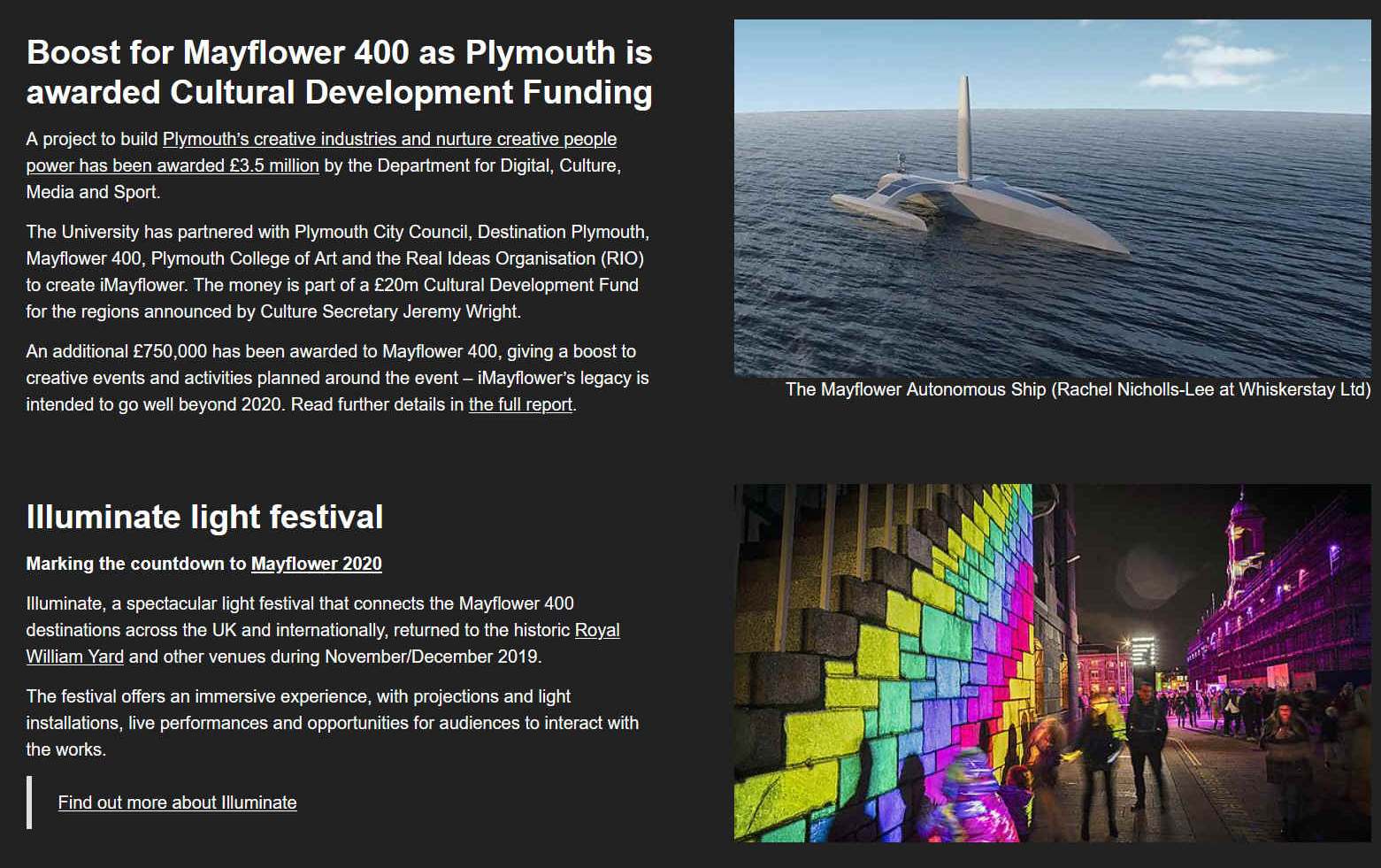
CONTACTS
University of Plymouth
Drake Circus, Plymouth
Devon, PL4 8AA
United Kingdom
Tel: +44 1752 600600
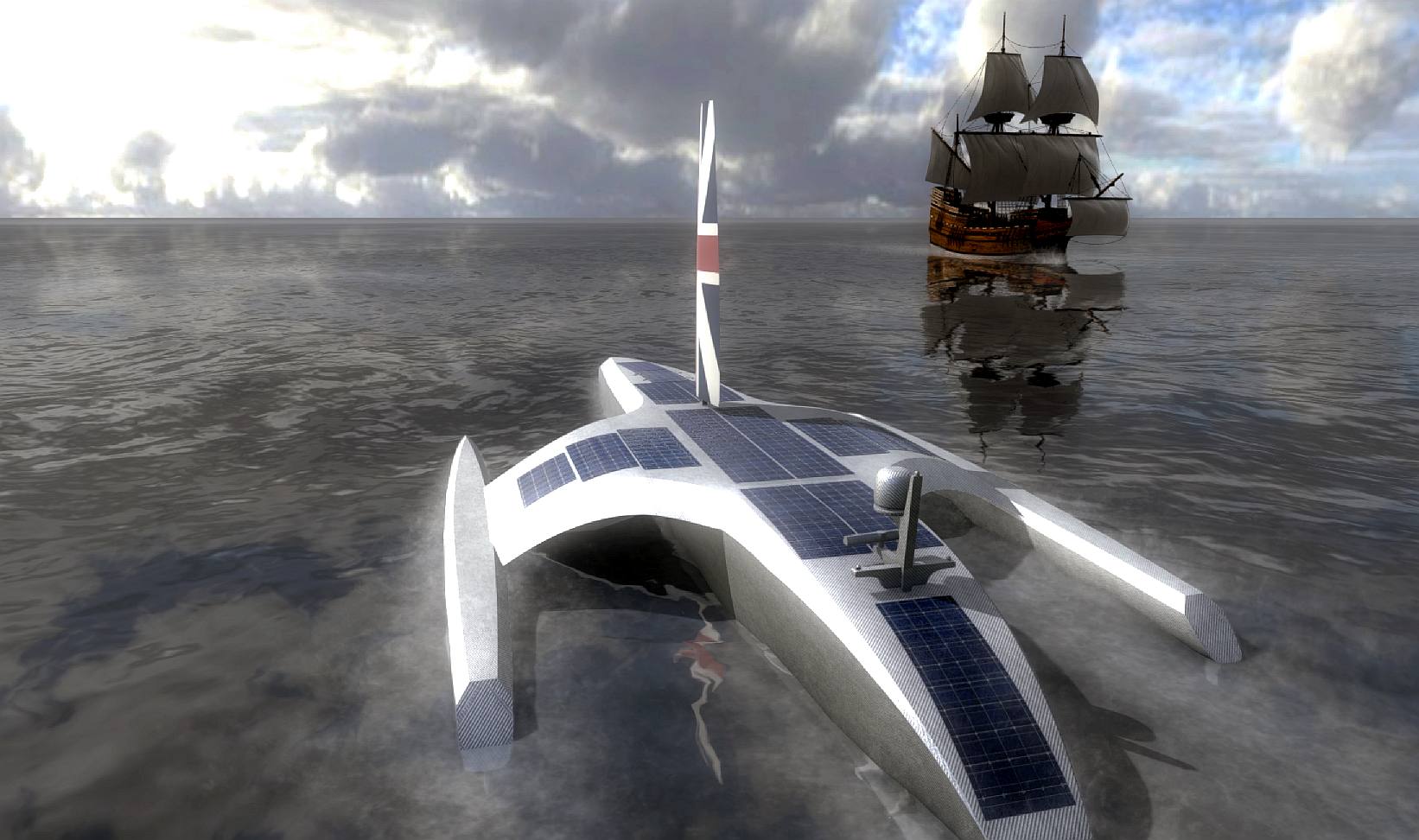
LINKS
& REFERENCE
https://www.plymouth.ac.uk/
https://mas400.com/
https://newsroom.ibm.com/then-and-now

|






